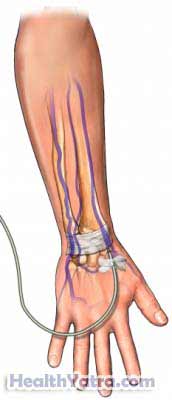Definition
A blood transfusion is the delivery of blood through a vein. The blood may come from an unrelated or related donor.
For planned procedures, some people have their blood drawn at an earlier date and stored until the transfusion is needed.
Reasons for Procedure
A blood transfusion should help increase your level of blood cells or other specific blood products. It may be needed if you have:
- Blood and fluid loss due to injury, surgery, or disease
- Severe anemia
- Bleeding disorders, such as von Willebrand’s disease or hemophilia
- Poor immune system
- Leukemia
- Diseases that result in destruction of blood cells or bone marrow
- Side effects of certain medicines such as chemotherapy for cancer
Possible Complications
Your doctor will review any possible complications with you. Complications from a blood transfusion are rare but may include:
- Severe reactions due to allergies, volume overload, iron accumulation, and the mismatching of blood types. Hospitals have several steps to make sure blood is correctly matched.
- Certain infections, such as hepatitis or HIV, can be passed on during blood transfusions. There are many steps and tests that are done to thoroughly check donated blood before anyone is allowed to receive it.
What to Expect
Prior to Procedure
- You will have a blood test to determine your specific blood type. The donor blood will be carefully matched to your blood type.
- You may also be given a physical exam. Your vital signs, including your temperature, heart rate, breathing rate, and blood pressure, will be recorded.
- You may be given Tylenol and Benadryl before you receive a transfusion. These drugs will help reduce any minor allergic reactions.
Description of the Procedure
You will be asked to sit in a comfortable chair. A bag containing the blood product will be hung nearby. An IV needle will be placed into a vein in your hand or arm. The blood product will drip slowly from the bag through a tube into your vein. After the bag of blood product is empty, the needle in your arm will be removed.
Throughout the transfusion, your vital signs will be checked regularly. You will also be asked about pain, itching, or discomfort of any sort. Most reactions occur early in a blood transfusion, so you will be monitored more closely during the first 15 minutes.
How Long Will It Take?
About 2–4 hours
Will It Hurt?
The placement of the IV needle is uncomfortable. After the needle is in place, it should not cause pain.
Post-procedure Care
At the Care Center
Immediately following your procedure, the staff may provide the following care:
- You will be monitored closely.
- Your doctor may give you specific instructions based on your overall condition.
- Your doctor may order blood tests to determine how effective the transfusion was.
At Home
When you return home after the transfusion, carefully follow your doctor’s advice regarding any activity restrictions or other instructions .

Call Your Doctor
After arriving home, contact your doctor right away if you experience any symptoms of an allergic reaction or infection, such as:
- New rash, hives, or itching
- Swelling in legs, feet, hands, arms, or face
- Lightheadedness
- Nausea and/or vomiting
- New onset of pain, especially in the back or chest
- Shortness of breath, wheezing
- Signs of infection, including fever and chills
- Redness, swelling, increasing pain, excessive bleeding, or discharge where the needle was inserted
In case of an emergency, call for medical help right away.
